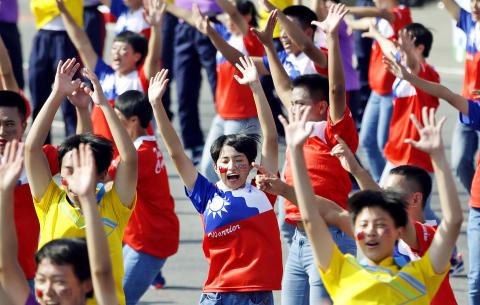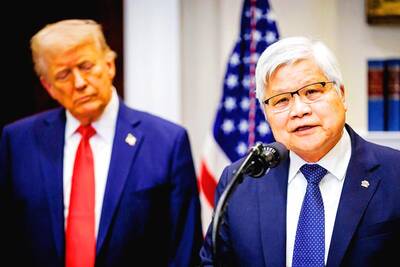President Tsai Ing-wen (蔡英文) yesterday in her Double Ten National Day address rejected the “one country, two systems” model proposed by Beijing as the future of cross-strait relations, while highlighting freedom, democracy and sovereignty.
“The overwhelming consensus among Taiwan’s 23 million people is our rejection of ‘one country, two systems,’ regardless of party affiliation or political position,” Tsai said at the ceremony in front of the Presidential Office Building in Taipei.
There would be no space for the existence of the Republic of China (ROC) if that framework were to be imposed on Taiwan, Tsai said, citing the violence in Hong Kong as an example.

Photo: Chiang Ying-ying, AP
As Taiwan’s president, standing up to protect the nation’s sovereignty is not a provocation to China, but a fundamental responsibility, she said, urging the public to stand with her in defending freedom and democracy.
Tsai said the term “Republic of China (Taiwan)” is an overwhelming consensus of Taiwanese society and not the exclusive property of any particular political party.
Touting her political achievements over the past three years, Tsai then outlined her goals, which are to unite people under the flags of freedom and democracy to defend sovereignty; to boost the nations’s economic power and national strength; and to overcome challenges and make the nation confident and proud of itself on the global stage.
Legislative Speaker Su Jia-chyuan (蘇嘉全) in his master-of-ceremonies address said that no totalitarian nation can stop free and democratic Taiwan from establishing new friendships, even though the nation’s diplomacy has been maliciously undermined.
Taiwanese pride could best be embodied by a “free spirit;” human rights are the shared belief of Taiwanese; and a well-developed democratic system has given Taiwanese strength, he said.
On the foundations of democracy, freedom and human rights, the nation has attained steady economic growth, created a wholesome social climate and won high acclaim for its healthcare system, he said, adding that the nation has also befriended many like-minded nations.
In a sense, as people make efforts to safeguard democracy, democracy is safeguarding them, Su said.
During his more than three years in office he has received 107 groups of lawmakers from other nations and they all expressed amazement at Taiwan’s democracy, Su said.
Although Taiwan faces many challenges in the international community, and its diplomacy has been maliciously compromised, freedom would ultimately prevail, he said.
The nation has been through colonialism and authoritarianism, but today it embraces democracy and freedom, and that means it is embraced by the rest of the world, he said, attributing this to the suffering, diligence and efforts of all Taiwanese.
Su expressed the hope that Taiwan’s virtues and progressiveness would be seen by the world; that the nation would forever stand unwavering in the Pacific no matter how great its future challenges are; and that future generations enjoy the freedoms enjoyed today and they are able to decide their own future.

ENDEAVOR MANTA: The ship is programmed to automatically return to its designated home port and would self-destruct if seized by another party The Endeavor Manta, Taiwan’s first military-specification uncrewed surface vehicle (USV) tailor-made to operate in the Taiwan Strait in a bid to bolster the nation’s asymmetric combat capabilities made its first appearance at Kaohsiung’s Singda Harbor yesterday. Taking inspiration from Ukraine’s navy, which is using USVs to force Russia’s Black Sea fleet to take shelter within its own ports, CSBC Taiwan (台灣國際造船) established a research and development unit on USVs last year, CSBC chairman Huang Cheng-hung (黃正弘) said. With the exception of the satellite guidance system and the outboard motors — which were purchased from foreign companies that were not affiliated with Chinese-funded

PERMIT REVOKED: The influencer at a news conference said the National Immigration Agency was infringing on human rights and persecuting Chinese spouses Chinese influencer “Yaya in Taiwan” (亞亞在台灣) yesterday evening voluntarily left Taiwan, despite saying yesterday morning that she had “no intention” of leaving after her residence permit was revoked over her comments on Taiwan being “unified” with China by military force. The Ministry of the Interior yesterday had said that it could forcibly deport the influencer at midnight, but was considering taking a more flexible approach and beginning procedures this morning. The influencer, whose given name is Liu Zhenya (劉振亞), departed on a 8:45pm flight from Taipei International Airport (Songshan airport) to Fuzhou, China. Liu held a news conference at the airport at 7pm,

KAOHSIUNG CEREMONY: The contract chipmaker is planning to build 5 fabs in the southern city to gradually expand its 2-nanometer chip capacity Taiwan Semiconductor Manufacturing Co (TSMC, 台積電), the world’s biggest contract chipmaker, yesterday confirmed that it plans to hold a ceremony on March 31 to unveil a capacity expansion plan for its most advanced 2-nanometer chips in Kaohsiung, demonstrating its commitment to further investment at home. The ceremony is to be hosted by TSMC cochief operating officer Y.P. Chyn (秦永沛). It did not disclose whether Premier Cho Jung-tai (卓榮泰) and high-ranking government officials would attend the ceremony. More details are to be released next week, it said. The chipmaker’s latest move came after its announcement earlier this month of an additional US$100 billion

Authorities yesterday elaborated on the rules governing Employment Gold Cards after a US cardholder was barred from entering Taiwan for six years after working without a permit during a 2023 visit. American YouTuber LeLe Farley was barred after already being approved for an Employment Gold Card, he said in a video published on his channel on Saturday. Farley, who has more than 420,000 subscribers on his YouTube channel, was approved for his Gold Card last month, but was told at a check-in counter at the Los Angeles International Airport that he could not enter Taiwan. That was because he previously participated in two